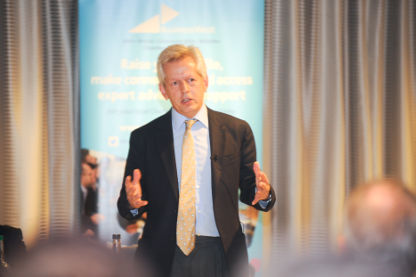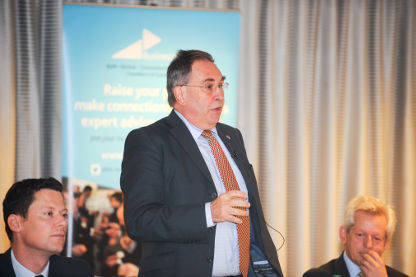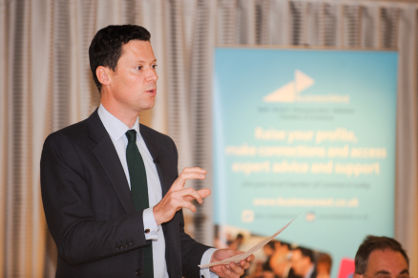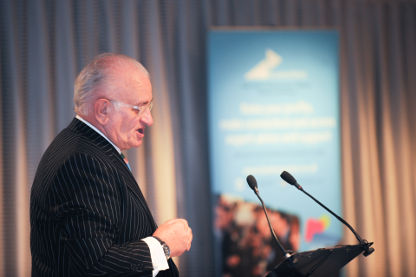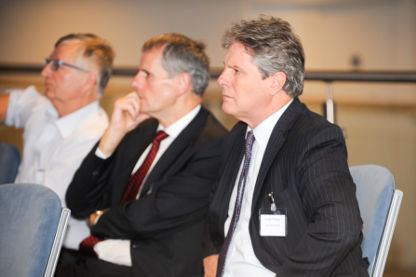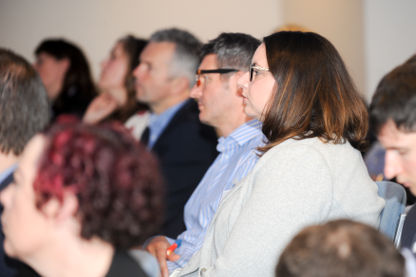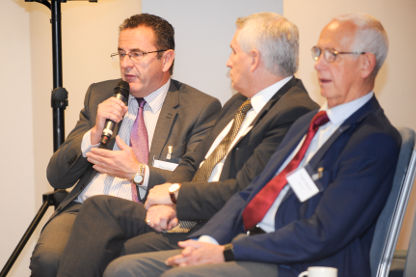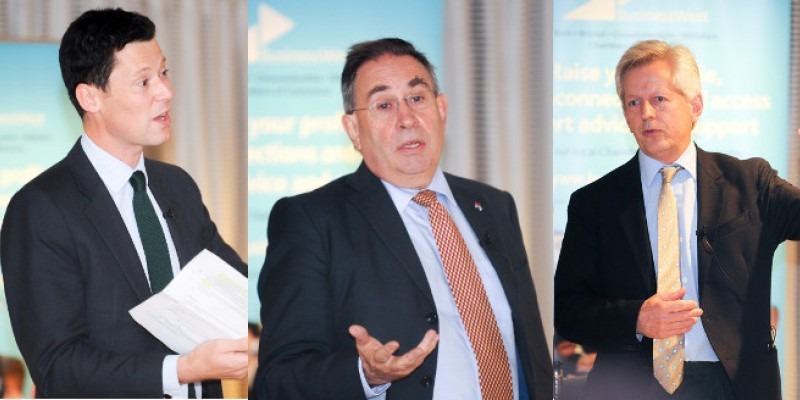
We have six members of Parliament in Gloucestershire and I invited them all to talk about matters of business, and Brexit, of course.
Three of them came - Gloucester’s Richard Graham, Alex Chalk from Cheltenham and Stroud’s newly elected MP, David Drew.
To be honest to get three of our MPs in one place at one time is going some, and I was very pleased they were able to come to the newly refurbished Bowden Hall Hotel at Upton St Leonards.
My agenda as Director for Business West in the county is simple.
I try to concentrate on being the voice of business on key issues and currently those are: the skills gap, affordable homes, Brexit and the future of Gloucestershire - the so called 2050 plan.
I asked our MPs to set out the issues as they affect business in their areas.
Richard Graham: “We have got fabulous diversity of business in this county and a huge amount going for us.
“We should start off by celebrating what we have got - we have got pretty good infrastructure.
“We must build on our strengths. We have considerable strengths in aerospace - every Typhoon in the Second World War was built in the Gloucester Aircraft factory. The past is fine but it is how you bring it alive today.
“If we are thinking ahead. My view is that Staverton is an absolutely critical part of our aerospace, and it should never be sold off for developers to make a big new town which links Cheltenham and Gloucester.
“In my view, it is time that we recognised what the future of this airport can be as a stimulant and allow it to expand.”
Low taxes will encourage what he called 'Glospreneurs'.
David Drew: “For people outside they probably don’t realise that Stroud is a very important manufacturing centre. The biggest problem we have in Stroud is the lack of employment land.
“It means that a third of our workforce migrate out every day-that is not acceptable in the world of sustainable development. We have got to develop more jobs."
He said he had a meeting with Network Rail and First Great Western and wants a half hourly train service now that the redoubling of the line had taken place.
“It is ridiculous that we have to wait and hour-sometimes two hours to get to London.”
He is quite right, of course.
“We need a decent transport infrastructure-that will only happen if we improve our rail and buses and dare I say it, have some extra money for roads."
“We are moving towards the notion of the electric highway. That is important in Stroud as we do also look towards Bristol and that sub regional development in terms of the electric highway is going to be really important to us.
“So, I would like to see some cabling alongside the M5 so we can genuinely bring some more vehicular movements between Bristol and the south of this country.
“It is a great place to live and it has got to be a great place to work because people have to work and live locally.
“I make no apology that my job is to get more jobs into Stroud, more employment land and make sure we drive our local economy so people can live in this wonderful county where I was born.”
Alex Chalk, MP for Cheltenham, highlighted business rates as a key issue for local business, and this is a big issue that has caused confusion in local business. He said that nationally, 600,000 firms are being taken out of Business Rates altogether.
“Apprenticeships mean that 18 year olds in my constituency have a genuine choice – should they go to university and weighing up if they think it is worth the investment or should they go straight into an apprenticeship.”
Alex said in Gloucester there had been up to £500m of investment and what he called “a powerful sense of direction” but in Cheltenham that was not the case.
I agree wholeheartedly in what Alex says. Cheltenham has hitherto been in the slow lane in terms of innovative ideas for investment and innovation in the town.
So, how was Cheltenham going to prosper, he asked?“If we are genuinely going to tackle some of the social problems where you have a big gap between rich and poor, you have to have solutions and my solution is to create more opportunities for young people.
“That is why I am so passionate on cyber. What is our big thing here in Cheltenham?
“GCHQ is getting £3bn of public money over the next ten years. In Israel, the equivalent of GCHQ sits cheek by jowl with their equivalent of Cambridge University - Ben Gurion - and they have created a cyber-park in the middle of the desert.
“I said to George Osborne this is what we should be doing in Cheltenham. Set up a cyber innovation centre with some of the finest minds moving out of GCHQ to nurture small business.”
Now, of course, the gFirst LEP - the local enterprise partnership - have won a £22 million bid towards the building of this new cyber park in the west of Cheltenham.
In the UK currently, cyber as a business is worth £22 billion - quite staggering but a real indication of why this new centre in Cheltenham will be so important to the county’s economic future.
Alex said that improved infrastructure in the county was important to “make these economic opportunities fly”.
He revealed that the three schemes for the nightmare A417 “Missing Link” were going out for consultation next month and expected spades in the ground in 2020 but more realistically in 2021.But don’t hold your breath on this project - there have been too many false dawns.
“I am absolutely determined to create the most jobs friendly and opportunity friendly environment there is in Gloucestershire - that is my mission”, was Alex’s commitment.
He said that schools funding was critically important. The average level of funding in Gloucestershire was £4,200 a head - now it is going up to £4,800.
We had some interesting and incisive questions to the MPs."Where do you see business growth coming from in the county?", asked Elliott Butlin of Bibby Financial Services.
Richard Graham: ”We have some great exporters in the county but there is a huge amount more we can do."
David Drew: “I think manufacturing is where we have to get it right. We are very good in this area in terms of the health , energy and increasingly with food.
“I believe that post Brexit, the production of food in the county gives us great opportunities - I believe we have to become 80 per cent self-sufficient. We have got a lot of unused farm land which we have to bring back into use.”
Alex Chalk: “There is a huge untapped potential in cyber, engineering and the service sectors
David Clapham of Bamboo Technology asked: "What one key benefit do you expect Brexit to deliver to your constituency in the next two years?"
Richard Graham: “I think one key strength is our diversity of business.
“Look at what Horizon are doing at the Hitachi owned business at Gloucester Business Park and also EDF Energy. We have got a huge number of different stakes in different businesses which is going to give our constituents the security of job opportunities regardless of the Brexit opportunities over the next two years.”
David Drew: “Businesses should just keep their heads down. There won’t be much happening over the next two years - we are obsessed with Brexit. There are other things happening in this country believe it or not.
“The danger is that if we just concentrate on Brexit, all the other balls just fall to the ground. That’s what worries me.”
Alex Chalk: “I do think there can be a cultural change where business start to lift their eyes beyond the horizon of Europe. I was a remainer but I realise there are great opportunities out there for firms in Cheltenham and Gloucester.”
Tom Brand of iLeader asked: What is the biggest factor undermining UK productivity?Richard Graham: “I don’t think we have a clue on productivity. I think it actually comes down to individual businesses - you can’t really look at it in the round.
“I don’t think there is a simple national solution.”
David Drew: ”I am sorry - it is obvious. If you are doing two or three jobs in your working life you are not going to be more productive - you are just eeking out an existence.
“I have countless examples where people come in from work and their partner goes out to work - we are not investing in the quality of our workforce. People feel devalued and if they feel devalued they are not productive.
“So, we have got at all levels to make people feel they matter and we will become more productive.”
I asked the MPs about the broadband service in their constituencies.
David Drew: ”Broadband is a huge factor - particularly in rural areas. It’s really important that people recognise where the problems are.
“We talk about 5G but in some parts of Stroud you are lucky to get 1G. Rural areas matter in Gloucestershire - a lot of people live and work from home and they can only do that if they have proper connectivity.”
Richard Graham: “There is one specific thing I have been discussing with Sajid Javid in government and that is when new developments go up have they got the copper already put in.
“This is a real issue. Time and time again, they find they have not got the Broadband service they expected or need.”
Paul Coles, BT’s regional director for Gloucestershire who was at the meeting, said: “Anywhere in Gloucestershire that doesn’t have Superfast Broadband, I will find the money to co-invest to get it done. We will sit down with any community.“There are areas which are not commercially viable to do. New sites keep me awake at night - we cannot mandate to be on any site. It is the developer who decides and we don’t ask for exclusivity.”
- Log in to post comments

